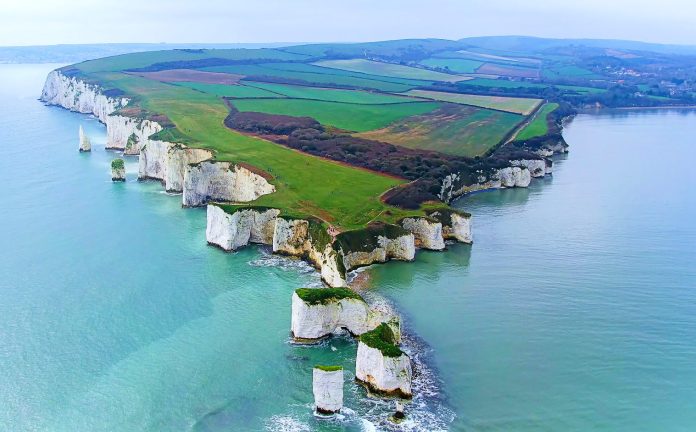Vodafone has deployed iSIM-based NB-IoT-connected sensor units, loosely resembling the printable iSIM tracker solution it developed with Altair and Arm for pharma firm Bayer last year, along the UK’s southern coast. The new project is to help academics, businesses, and local authorities bring new intelligence and efficiency to environmental monitoring, smart farming, and public safety.
The project, part of the UK government’s 5G RuralDorset initiative, is already live along the UK’s Jurassic Coast, designated by UNESCO as a world heritage site, stretching around 150 kilometres through Dorset and Devon.
Vodafone said it is in position to expand coastal monitoring into mainland Europe, to cover up to 68,000 kilometres of coastline, based on the fact its NB-IoT network covers 21 European countries. It should be noted, the new UK deployment is not the same deal the UK provider spoke with Enterprise IoT Insights about this month for a Europe-wide OEM rollout for “multi-millions” of NB-IoT devices.
The latter project, still to be revealed, will break the “scale barrier” for NB-IoT as the biggest ever IoT airtime supply deal outside of China, and as a driver of ‘massive IoT’, Vodafone reckons. By contrast, the new UK venture is “completely different, more experiential,” a spokesperson remarked. It hinges on a new “universal” sensor device, developed by Vodafone, which leverages the company’s NB-IoT setup in the UK, recently doubled in size.
The new sensor unit, patented by Vodafone, features a proprietary version of iSIM technology. The UK operator produced another iSIM NB-IoT unit for a seminal pilot iniatiative with pharmaceutical and life sciences company Bayer at the end of last year, continuing now, which has also involved chipmaker Altair (now Sony Semiconductor Israel), SIM specialist Kigen, and module maker Murata. The Bayer project focused on a a printable smart label developed to track goods throuh its supply chain worldwide.
Vodafone said the 5G RuralDorset tracker measures four-by-five centimetres, integrating a similar iSIM and modem setup to the Bayer hardware, and connects to Vodafone’s NB-IoT network in the UK. A statement says it connects to Vodafone’s NB-IoT network “using 2G, 4G and 5G, or via GPS satellite”, which may refer to the ‘bootstrapping’ process, rather than the access network, to provision the units onto the network.
A statement said: “Vodafone is providing the data through common API’s so the recipient can easily interpret it and apply it to their own systems. A direct power source or recharging is not required as it can operate independently for between 15 and 20 years using either a LiPo battery or a solar charger.”
Vodafone UK is pushing NB-IoT as a complement to its standard cellular connectivity, and as the “right tool for the right job” for low-level sensing tasks. Vodafone is offering NB-IoT airtime for a flat-rate start-fee of €12.99 for 10 years, with coverage in 55 markets globally. As well as coastal monitoring, of cliff slippages and safety issues, the Jurassic Coast sensors will be available to local farmers to harvest “more relevant data on cows, soil, and tractors”.
The project has started with trials of cliff monitoring and smart farming, as part of the 5G RuralDorset initiative, providing funding for 5G-based and 5G-related experiments. Besides Vodafone, 5G RuralDorset is working with Dorset Council, the British Geological Survey (BGS), and Bournemouth University, to produce a “monitoring system using authoritative geoscientific data to help decision-makers manage coastal hazards and improve resilience”.
A statement said: “Data collected by sensors developed by Bournemouth University include ground movement, groundwater changes, and other environmental factors such as ground temperature The data will be processed and analysed in the cloud using artificial intelligence and machine learning methods developed by Bournemouth University, for interpretation by BGS experts.”
The Jurassic Coast, one of only four natural sites across the UK to hold world heritage status, has seen five cliff movements in 2021, including a major landslide in April which saw more than 4,000 tonnes of rubble slip from the cliff face. “Ongoing erosion represents a significant danger to people and buildings as well as threatening the devastation of one of the country’s most outstanding areas of natural beauty,” said Vodafone.
The smart farming trial is organised by local broadband provider Wessex Internet, which is providing the sensors in the NB-IoT units on a number of Dorset farms to offer “real-time” data about the health of soil, the quality of streams and rivers, and the whereabouts of cattle and high value machinery. Wessex Internet is also providing the device and data management platform.
Johan Wibergh, chief technology officer at Vodafone, said: “The global reach of our digital networks and technologies has a key role in addressing climate change, from monitoring the health of forests to re-establishing connectivity following flash floods. Now, we are turning our attention to the very real threat of coastal erosion. We are freeing up our engineers to work with scientists on this and other pressing matters across Europe and Africa.”
Peter Wharf, deputy leader at Dorset Council, said: “The announcement of this new device represents a big milestone in the research work we’re conducting into coastal cliff monitoring and we’re proud to be working alongside Vodafone to make this important work a reality. Cliff failures are a very dangerous problem not only in Dorset but other coastal regions which see huge numbers of visitors every year.”
He added: “This research, along with the coastal public safety trials, is critical to people’s safety and the long-term prosperity of the area. Current monitoring methodologies are also very costly for the council and this new technology will hopefully provide significant savings in future.”

